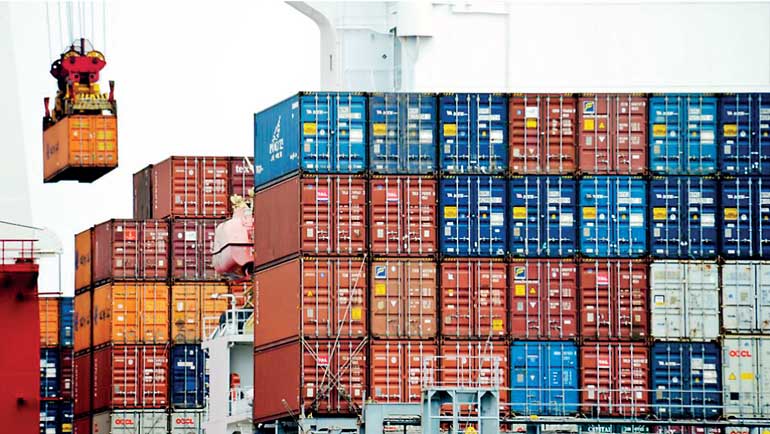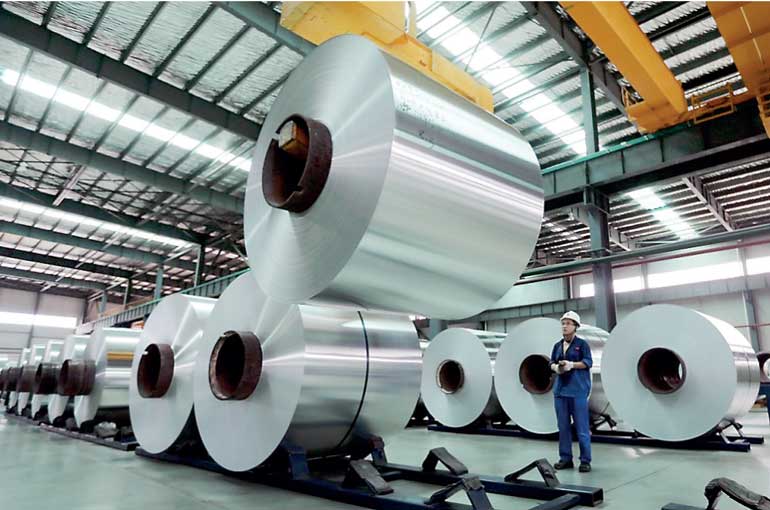Sunday Feb 22, 2026
Sunday Feb 22, 2026
Friday, 16 March 2018 00:00 - - {{hitsCtrl.values.hits}}
 WASHINGTON (Reuters): The Trump administration is pressing China to cut its trade surplus with the United States by $100 billion, a White House spokeswoman said on Wednesday, clarifying a tweet last week from President Donald Trump.
WASHINGTON (Reuters): The Trump administration is pressing China to cut its trade surplus with the United States by $100 billion, a White House spokeswoman said on Wednesday, clarifying a tweet last week from President Donald Trump.
Last Wednesday, Trump tweeted that China had been asked to develop a plan to reduce its trade imbalance with the United States by $1 billion, but the spokeswoman said Trump had meant to say $100 billion.
The United States had a record $375 billion trade deficit with China in 2017, which made up two thirds of a global $566 billion U.S. trade gap last year, according to U.S. Census Bureau data.
China reported its 2017 U.S. trade surplus as $276 billion, also about two thirds of its reported global surplus of $422.5 billion.
The White House spokeswoman declined to provide details about how the administration would like China to accomplish the surplus-cutting goal — whether increased purchases of U.S. products such as soybeans or aircraft would suffice, or whether it wants China to make major changes to its industrial policies, cut subsidies to state-owned enterprises or further reduce steel and aluminum capacity.
The request comes as the Trump administration is said to be preparing tariffs on imports of up to $60 billion worth of Chinese information technology, telecoms and consumer products as part of a U.S. investigation into China’s intellectual property practices.
It is also unclear if the requested $100 billion reduction would address U.S. complaints about China’s investment policies that effectively require U.S. firms to transfer technology to Chinese joint venture partners in order to gain market access.
The issue is a core part of the probe being conducted under Section 301 of the Trade Act of 1974, a provision seldom invoked since the World Trade Organization was founded in 1995. Trade experts have said tariffs imposed as a result of the China intellectual property probe may fall outside of WTO rules.
In a Thursday editorial, widely-read Chinese state-run tabloid the Global Times said the United States was trying to play the victim.
“If the U.S. wants to reduce its trade deficit, it has to make Americans more hard-working and conduct reforms in accordance with international market demand, instead of asking the rest of the world to change,” it wrote.
“Once a trade war starts, capable countries won’t bow to the U.S. China has tried hard to avoid a trade war, but if one breaks out, appeasement is not an option.”
But Washington showed on Wednesday that it has not abandoned the global trade body, launching a WTO legal challenge to India’s export subsidies for domestic companies, including producers of steel, chemicals, pharmaceuticals, textiles and IT products.
U.S. Trade Representative Robert Lighthizer said India had failed to remove the subsidies as required by WTO rules after the country reached certain economic benchmarks.
The United States is expected to invoke a national security exception to WTO rules in imposing import tariffs of 25 percent on steel and 10 percent on aluminum announced by Trump last week. U.S. Commerce Secretary Wilbur Ross told lawmakers on Wednesday his department would soon publish procedures for product-specific exemptions from the steel tariffs for items that are not available from domestic producers or in short supply.
The procedures are due by Sunday.
Anne Forristall Luke, president of the U.S. Tire Manufacturers Association, said the group would be “pressing very hard” for an exemption from tariffs for high-strength wire rod used to make cord for steel tire belts that is not produced by U.S. mills.
The largest sources for the material are Japan and Brazil, she said, adding that U.S. tire producers will lose business to foreign competitors if their steel costs rise.
“We are working this from the product side and the country side. We think we have a very good case,” she told Reuters.
BERLIN (Reuters): US import tariffs on metals should have a limited effect on a global recovery, but any escalation into a full-blown trade war and related growing uncertainty could cause tangible damage, the German economy ministry said on Thursday.
“The German economic upswing is continuing at the beginning of 2018. The global economic environment is still favourable,” the ministry said in its monthly report.
“However, U.S. trade policy is creating a sense of uncertainty,” the ministry said.
U.S. import tariffs on steel and aluminium will affect some regions, but the overall implications for the global economy are likely to be manageable, the ministry said.
“But a possible escalation into a trade war and rising uncertainty among market participants could cause tangible damage,” the ministry added.
Singapore (Reuters): Singapore’s central bank chief said on Thursday that there is now a real risk of a trade war that could deal a devastating blow to the global economy.
U.S. President Donald Trump has recently imposed tariffs on steel and aluminum imports, sparking threats of retaliation from some trade partners, and called on China to cut its trade surplus with the United States by $100 billion.
The move has sent stock markets around the world tumbling as fear of a trade war mounts.
“There is a real risk now that that (trade war) would happen because these things are not easy to control. And while everyone agrees that a trade war is bad, sometimes you can’t help but retaliate when you are hit with tariffs,” Ravi Menon, the managing director of the Monetary Authority of Singapore (MAS), said at the Asia Money2020 conference in Singapore.
Asked what impact such a trade war would have on the global economy, Menon said it would be “devastating”.
 People’s Daily: The US tariffs on steel and aluminum imports are, in essence, a kind of trade protectionism in the guise of national security, Chinese Ministry of Commerce said, expressing China’s firm opposition to its decision.
People’s Daily: The US tariffs on steel and aluminum imports are, in essence, a kind of trade protectionism in the guise of national security, Chinese Ministry of Commerce said, expressing China’s firm opposition to its decision.
The statement came after the US President Donald Trump signed proclamations to impose hefty tariffs on imported steel and aluminum amid mounting dissent from business groups and trading partners around the world.
The majority of steel and aluminum imported by the US was for civilian use and by no means impairs its national security, stressed Wang Hejun, head of trade remedy and investigation bureau at the Ministry of Commerce.
China strongly opposes the US plan, as its abuse of the “national security” provision is a wanton sabotage of the multilateral trade system represented by the World Trade Organization, said Wang, adding that such kind of abuse will undermine the normal international trading order.
China will take strong measures to defend its legitimate rights and interests after assessing the losses caused by the US measures, stressed Wang, adding that China has expressed its position and concerns, and lodged solemn complaints to the US side through multiple channels.
What the measures damage is not only the interests of other countries, but also that of the US, Wang pointed out, stressing that it has incurred complaints from US congressman, industrial associations, as well as businesses.
China urged the US to respect the multilateral trade system and revoke the policy as soon as possible, Wang said.
The tariffs, 25 percent on imported steel and 10 percent on aluminum, will take effect in 15 days after the announcement by Trump on March 8 at White House.
The latest protectionist policy has drawn fierce resistances from both the US and international community. The EU, Brazil, the Republic of Korea (ROK), Japan, France, the UK and Australia have all vowed to take countermeasures against it.
European Commission President Jean-Claude Juncker responded that the EU will “react firmly and commensurately” to defend its interests.
A worker is working at an aluminum production plant in central China’s Anhui province on Aug. 3, 2017. (Photo from CFP)